Atra is also trying to understand where the gaps are in training, especially for more experienced rabbis who are not recent seminary graduates.
While some rabbis are still associated with the traditional pulpit leadership model, serving in established synagogues or at educational institutions, today’s spiritual leaders serve various roles within their communities, across denominations and contexts. From fiery sermonizers to innovative educators, from community advisors to emergent community founders, the changing appearance of the rabbinate creates a need for Jewish spiritual leaders to receive additional investment and training — to meet contemporary communal needs and build a stronger national network of rabbis.
Launched more than six years ago as the Center for Rabbinic Innovation – a small, incubated program in the Office of Innovation, which is fiscally sponsored by Hillel International – Atra, as the organization is now known, trains and supports rabbinic leaders from all backgrounds to adapt their practice for the real world, to help them grow professionally and propel their leadership. During the pandemic, the organization also received a Jewish Community Response and Impact Fund grant to support the Rabbinic (re)Design Lab, which empowered clergy to imagine and pilot new approaches to engaging communities during the High Holy Days.
Atra’s new name invokes the Aramaic phrase “mara d’atra,” meaning the teacher or rabbi who serves a particular place, a hat tip to the modern ubiquity of places where rabbis can be found. Over the next three years, the organization expects to expand its outreach to rabbis and other Jewish spiritual leaders, as well as bring 45 organizational partners into the emerging conversation about what makes a rabbi, Rabbi Shira Koch Epstein, Atra’s executive director, told eJewishPhilanthropy.
The organization’s strategic plan (available online here) calls for program expansion, establishing a field of rabbinic training, new research and a stronger national network among rabbis, and is supported by recent grants from Crown Family Philanthropies and the Jim Joseph Foundation. Those new grants, along with other donor contributions, total more than $2 million toward the organization’s $6 million strategic plan.
“We believe that rabbis are a key gateway, models and change agents for Jewish identity, meaning, ethics and practice for the Jewish people,” said Barry Finestone, president and CEO of the Jim Joseph Foundation. “There’s a demonstrated need for more skilled rabbis as leaders in the North American Jewish community. Rabbinic training as a field has been under-resourced. Importantly, Atra has developed practical and effective ways to provide relevant, needed training for rabbinic leaders serving in the field across the denominational spectrum and in a range of settings.”
Atra has a current budget of $1.5 million, with four full-time and two part-time staff members. By 2025, the organization expects to launch as an independent 501(c)(3) and to expand to six full-time with a director of faculty and research faculty. The leadership has chosen not to invest in physical offices for the time being, instead renting program spaces as needed. Epstein said that the leadership is lining up strategic advisors and funders to help them grow.
“We know that rabbis engage people in all kinds of settings throughout people’s life stages and inflection points,” Finestone explained. “We need Jewish leaders who are equipped to transform the future of North American Judaism in the 21st century through learning and other experiences that have meaning and resonance in people’s lives.”
The Jim Joseph Foundation also funded Atra to conduct a study on the relationship between rabbis and Jewish Americans from the ages of 18-44. “Since rabbis engage young Jews in so many settings, it’s important to understand what factors make those interactions and experiences most meaningful and relevant in young people’s lives,” said Finestone regarding the study, which will be released in mid-March. Atra commissioned the research and managed the project; the foundation did not provide input on the questions.
One of Atra’s first tasks is to establish metrics around “excellence,” Epstein told eJP. “There really has been very little research on what a rabbi is, what a rabbi does and what it looks like when a rabbi is good at what they do. We don’t even have metrics for saying what makes us good rabbi. And if we’re going to help ensure that rabbis are excellent, we need to know what that means.”
The study being released in March is the first one in at least 30 years, Epstein noted, and anticipates that such research will happen every few years moving forward. The research should also “inform a conversation not just for us, but for everyone who’s trying to ensure that there’s excellence in rabbinic leadership,” she explained.
With different seminaries preparing rabbis differently for their work, Atra is also trying to understand where the gaps are in training, especially for more experienced rabbis who went to seminaries somewhere between one and four decades ago. These gaps might include updating their social media or technology fluency, improving their management or communication skills, and using community organizing principles to activate their communities, Epstein and Ariel Moritz, the director of program operations at Atra, told eJP.
“We know that the locus of authority has changed and people are often looking at influencers, not at authority. So how do rabbis learn how to communicate as skilled, knowledgeable, effective leaders with a group of people who are not necessarily listening to a sermon. They want to have a reciprocal relationship with their rabbi,” Epstein said. “The rabbi needs to learn where that person is.”
While some rabbis may be starting a new community to fill a demographic or cultural gap in the community, they may not have training on management or how to create a startup, Moritz said. “So they find themselves wearing a whole bunch of hats and will often turn to us to figure out how to do that work.”
The grant will enable Atra to expand its programs such as its rabbinic entrepreneur fellowship, Troubleshooting the Chagim and the Rabbinic (re)Design Lab. While many Jewish organizations have adopted the Design Thinking approach to idea and program development, Atra uses the Lean Startup method. In addition to being less time-consuming than Design Thinking, Lean Startup includes identifying a problem or challenge and then developing a minimum viable product (MVP) to test. In the case of rabbinic training, Epstein said, “You have an idea, you have an audience that you know exists that you are talking and listening to, you have a question and an idea for what might serve them. You test it with a small test, and then you learn and then you iterate.”
CRI had been serving mostly early-career rabbis, as well as mid-career rabbis seeking to expand their skill sets prior to the pandemic. But after 2020, synagogues and rabbis “could not pretend that they knew how to deal with the changed reality,” said Epstein. “Everybody already needed new skills. We recognized that we had tools that we had been teaching that would be really useful.” The large grant from JCRIF helped them to launch new programs in response to what the movements’ rabbinic organizations told CRI their rabbis needed. While some CRI cohorts were by denomination — the Reform Central Conference of American Rabbis and the Conservative Rabbinical Assembly, for example — most of the participants wanted programs that are pluralistic, as most CRI programs are.
Atra is now moving into a regional strategy, building cohorts in specific cities to be announced at a later date. Epstein expects at least one city to launch in the next year, and notes that even if all rabbis want to learn new skills, Atra programs differ between cities, “because every city or region’s Jewish community, and current communal infrastructure is a little bit different…When we look at a region [we ask] what is the Jewish need here, how might we work with these rabbis to address that need,” she said. “We’re trying to go slowly enough to actually build what’s necessary.”
Part of that process is strengthening the network — establishing partnerships and collaborations with other organizations, such as the Jewish Education Project and the Association for Reform Jewish Educators — and developing critical infrastructure toward greater independence in 2025.
“I also think it’s really exciting how many people are investing in rabbinic leadership and how many philanthropies and Jewish foundations are renewing their look at rabbinic leadership,” Epstein said. She added that The Aviv Foundation, Maimonides Fund, Charles & Lynn Schusterman Family Philanthropies, Natan and UJA-Federation of New York are among the grantmakers that have started funding the field.
Over the next few months, Atra will release the report from its research study and launch a new website in April to grow its network and make its programs and resources more accessible. In the interim the strategic plan is available and the organization is actively recruiting for its programs.
Another part of Atra’s job is to help rabbis figure out the best model for sustainability, both of the larger Jewish community and also on the practical level, determining revenue structure, considering whether or not to have membership dues. Jewish philanthropy will continue to generate some of the support for Atra. “We want to be excellent stewards of tzedakah,” Epstein said, adding that the organization plans to grow its infrastructure thoughtfully and methodically. “We believe that, as we do that well, people will know that if they want to invest in excellent rabbinic leadership, we’ll be able to use their tzedakah to make that happen.”
The organization is also looking at different fee-for-service opportunities, especially since most rabbis don’t really have large amounts of money designated for their own career development and training. It also has a small pilot program to connect excellent innovative rabbis with philanthropists who want to invest in their projects. Along with this comes helping rabbis to understand how to measure their work’s impact, ask for financial support and report to donors on their investment.
“Rabbis need a lot of help and support,” Epstein said. “We need their careers to be sustainable, we need them to be excellent for a long time.”
“Atra—formerly the Center for Rabbinic Innovation—seeks to support rabbis in a changing world,” eJewish Philanthropy, March 1, 2023
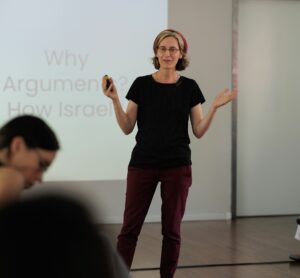 meaningful ways. Its book Stories for the Sake of Argument, includes 24 stories that provide opportunities to discuss some of the more controversial issues in Israel. FSA’s newest short story, Anything to Celebrate?, was released in advance of Yom Ha’atzmaut and grapples with the complexities of celebrating Israel at this time. Building on this, FSA will soon release a series of short stories that explore the proposed judicial reforms and the protests sweeping Israel. In the coming months, the organization also will release a short, theme-based curriculum for schools, youth movements, Hillels and other educational organizations to use in their settings and during their organization’s trips to Israel.
meaningful ways. Its book Stories for the Sake of Argument, includes 24 stories that provide opportunities to discuss some of the more controversial issues in Israel. FSA’s newest short story, Anything to Celebrate?, was released in advance of Yom Ha’atzmaut and grapples with the complexities of celebrating Israel at this time. Building on this, FSA will soon release a series of short stories that explore the proposed judicial reforms and the protests sweeping Israel. In the coming months, the organization also will release a short, theme-based curriculum for schools, youth movements, Hillels and other educational organizations to use in their settings and during their organization’s trips to Israel.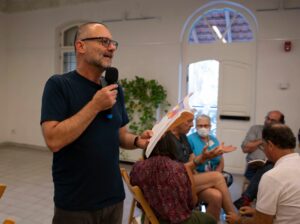 FSA offers many ways for educators and leaders to learn about this approach to education. A 90-minute introductory workshop models the FSA framework and tools, and in-depth courses for professionals provide a deeper mastery of engaging with contentious issues. FSA’s open online resource center has tips and specific language for healthy arguments, animated videos, and short written pieces sharing pertinent research. New stories cover all kinds of timely topics–Who is Welcome? delves into interfaith marriage and how different values affect family dynamics; Tweeting Israel covers the legitimacy of vocal criticism of Israeli politicians from Jewish leadership outside of Israel; and What is It All About? explores what Yitzhak Rabin Memorial Day means to different groups within Israeli society. FSA also offers consultations with individuals and organizations thinking about the role of arguments and disagreements in their work.
FSA offers many ways for educators and leaders to learn about this approach to education. A 90-minute introductory workshop models the FSA framework and tools, and in-depth courses for professionals provide a deeper mastery of engaging with contentious issues. FSA’s open online resource center has tips and specific language for healthy arguments, animated videos, and short written pieces sharing pertinent research. New stories cover all kinds of timely topics–Who is Welcome? delves into interfaith marriage and how different values affect family dynamics; Tweeting Israel covers the legitimacy of vocal criticism of Israeli politicians from Jewish leadership outside of Israel; and What is It All About? explores what Yitzhak Rabin Memorial Day means to different groups within Israeli society. FSA also offers consultations with individuals and organizations thinking about the role of arguments and disagreements in their work.
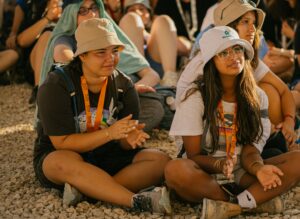
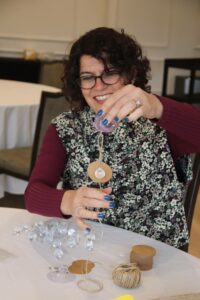 Understanding these initial human responses,
Understanding these initial human responses, 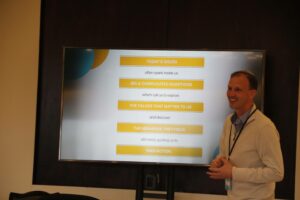 first organizational partner, and then introducing a second organizational partner in early 2023. M²
first organizational partner, and then introducing a second organizational partner in early 2023. M²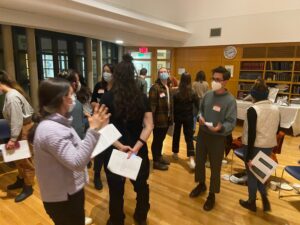 Adults need the space and “the right folk” to have big conversations together. This is especially true during liminal life moments, when people often engage with IYUN as they are searching, exploring, and seeking meaningful connections. The years when someone leaves their childhood home, for example, but before they set down roots in a new family home, are opportune times to encounter deep jewish living.
Adults need the space and “the right folk” to have big conversations together. This is especially true during liminal life moments, when people often engage with IYUN as they are searching, exploring, and seeking meaningful connections. The years when someone leaves their childhood home, for example, but before they set down roots in a new family home, are opportune times to encounter deep jewish living.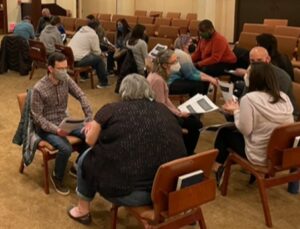 Jews asked big questions about their life and purpose, as they sought meaning, community, and connection. Building on the project’s initial success, IYUN’s leaders, Rabbi Daniel Smokler and Erica Frankel, see a unique opening to engage many thousands of adults in big conversations through Torah. This opportunity they say is due in part to the fruits of decades of outstanding work in Jewish education, making the case in thought and practice for the importance of widespread Torah study. Their previous work growing Hillel’s Jewish Learning Fellowship—now on 200+ campuses with over 20,000 alumni—demonstrates that Torah study, once an afterthought among Jewish college students, is an integral part of the Hillel experience. Those college alumni are the adults now ready to lead and engage in Jewish communal life. And IYUN’s leaders are capitalizing on a chance—perhaps once in a generation or more—to reach beyond those who are currently studying and immediately adjacent to the next levels of Jewish life. With this approach, more adults at inflection points will experience new friendships, meaningful space for thought and reflections, and will develop a lasting love engagement with Torah and Jewish life.
Jews asked big questions about their life and purpose, as they sought meaning, community, and connection. Building on the project’s initial success, IYUN’s leaders, Rabbi Daniel Smokler and Erica Frankel, see a unique opening to engage many thousands of adults in big conversations through Torah. This opportunity they say is due in part to the fruits of decades of outstanding work in Jewish education, making the case in thought and practice for the importance of widespread Torah study. Their previous work growing Hillel’s Jewish Learning Fellowship—now on 200+ campuses with over 20,000 alumni—demonstrates that Torah study, once an afterthought among Jewish college students, is an integral part of the Hillel experience. Those college alumni are the adults now ready to lead and engage in Jewish communal life. And IYUN’s leaders are capitalizing on a chance—perhaps once in a generation or more—to reach beyond those who are currently studying and immediately adjacent to the next levels of Jewish life. With this approach, more adults at inflection points will experience new friendships, meaningful space for thought and reflections, and will develop a lasting love engagement with Torah and Jewish life. 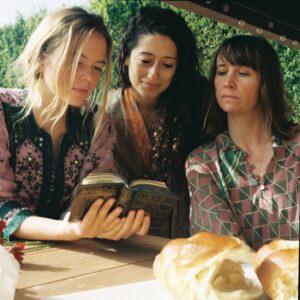
 to meet the moment and provided opportunities for deep connection when it was needed most, including:
to meet the moment and provided opportunities for deep connection when it was needed most, including: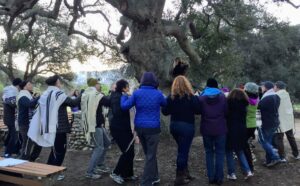 In the past year, more than 10,000 people participated in IJS’s offerings—from online courses on Jewish mindfulness meditation, Tikkun Middot, and prayer as personal practice, to master teachers leading the daily sit, weekly Torah study, and online Yoga studio. IJS also offered specialized training for more than 300 JCC professionals and reached thousands more through its podcast, online retreats, and numerous other programs. These efforts are proven to have positive outcomes. 94 percent of participants in IJS programs say they are more emotionally resilient. And 87 percent of participants say that Jewish spiritual practice deepened their connection with their Jewishness.
In the past year, more than 10,000 people participated in IJS’s offerings—from online courses on Jewish mindfulness meditation, Tikkun Middot, and prayer as personal practice, to master teachers leading the daily sit, weekly Torah study, and online Yoga studio. IJS also offered specialized training for more than 300 JCC professionals and reached thousands more through its podcast, online retreats, and numerous other programs. These efforts are proven to have positive outcomes. 94 percent of participants in IJS programs say they are more emotionally resilient. And 87 percent of participants say that Jewish spiritual practice deepened their connection with their Jewishness.